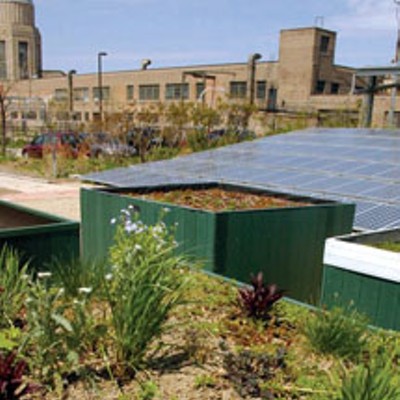Earth Talk
From the editors of E/The Environmental Magazine
[
{
"name": "Air - MedRect Combo - Inline Content 1",
"component": "11490391",
"insertPoint": "3",
"requiredCountToDisplay": "1",
"parentWrapperClass": "fdn-ads-inline-content-block"
},{
"name": "Air - MedRect Combo - Inline Content 2",
"component": "11490392",
"insertPoint": "7",
"requiredCountToDisplay": "5",
"parentWrapperClass": "fdn-ads-inline-content-block"
},{
"name": "Air - MedRect Combo - Inline Content 3",
"component": "11490393",
"insertPoint": "12",
"requiredCountToDisplay": "9",
"parentWrapperClass": "fdn-ads-inline-content-block"
}
]
Dear “Earth Talk”: Are there any
environmentally friendly alternatives to using chemical weed killers such
as Roundup? — Wyatt Walley, Needham, Mass.
The active ingredient in Monsanto’s Roundup, glyphosate, is a known toxin. This is, of course, why it is so successful in eradicating weeds. In fact, glyphosate is the most commonly used pesticide in the United States, and the U.S. Environmental Protection Agency estimates that more than 5 million pounds of it are used in American yards and gardens annually. Caroline Cox, staff scientist at the Northwest Coalition for Alternatives to Pesticides, says that gardeners wouldn’t use Roundup if they knew about all of the problems attributed to its use. For instance, ingesting about three-fourths of a cup can be lethal. Symptoms of casual contact can include eye and skin irritation, lung congestion, and erosion of the intestinal tract. Roundup has also been linked to cancer, miscarriages, and genetic damage in human beings, so it’s no wonder that NCAP and other organizations are pushing for safer alternatives. Environmentally, the product is thought to be implicated in immune-system damage in fish and reproductive disruption in amphibians. Over a recent eight-year study period in California, glyphosate was the third most frequently reported cause of illness related to agricultural pesticide use. And scientists from the National Cancer Institute and three prominent medical centers have shown the use of glyphosate herbicides by Midwestern farmers to be associated with many cases of non-Hodgkin’s lymphoma. Roundup contains other nonactive ingredients, contact with which can cause nausea, diarrhea, chemical pneumonia, laryngitis, and severe headaches. Luckily, reports Cox, “there are effective pesticide-free solutions to the weed problems in our yards and gardens.” For instance, mulches made from wood chips, straw, grass clippings or shredded bark can be used to keep weed seeds from germinating. Quite simply, by keeping light from reaching weeds, a thick mulch layer naturally inhibits the growth of the chlorophyll that is the lifeblood of fast-growing weeds. Cox also says that maintaining healthy, well-aerated soil is essential to a program of chemical-free weed control and suggests using organic fertilizer where needed. Longer grass, between 2 and 3 inches tall, also helps keep weeds in check without chemicals. When weeds do appear anyway, Cox recommends nonchemical weeding tools such as hoes, string trimmers, weed-pullers, flame weeders, or radiant-heat weeders. Local organic nurseries can help you determine which techniques will work best in your area. One added benefit of giving up the Roundup habit is the blossoming of beneficial plants, fungi and creepy crawlies in your yard. Because Roundup is toxic to a wide range of important ecological builders such as ladybugs, beetles, earthworms, and fungi, going without can help bring these species back to work aerating your soil and keeping virulent pests in check naturally.
For more information: Northwest Coalition for Alternatives to Pesticides Healthier Homes and Gardens Program, www.pesticide.org/HHG.html.
Send questions to “Earth Talk” in care of E/The Environmental Magazine, P.O. Box 5098, Westport, CT 06881; or e-mail [email protected].
The active ingredient in Monsanto’s Roundup, glyphosate, is a known toxin. This is, of course, why it is so successful in eradicating weeds. In fact, glyphosate is the most commonly used pesticide in the United States, and the U.S. Environmental Protection Agency estimates that more than 5 million pounds of it are used in American yards and gardens annually. Caroline Cox, staff scientist at the Northwest Coalition for Alternatives to Pesticides, says that gardeners wouldn’t use Roundup if they knew about all of the problems attributed to its use. For instance, ingesting about three-fourths of a cup can be lethal. Symptoms of casual contact can include eye and skin irritation, lung congestion, and erosion of the intestinal tract. Roundup has also been linked to cancer, miscarriages, and genetic damage in human beings, so it’s no wonder that NCAP and other organizations are pushing for safer alternatives. Environmentally, the product is thought to be implicated in immune-system damage in fish and reproductive disruption in amphibians. Over a recent eight-year study period in California, glyphosate was the third most frequently reported cause of illness related to agricultural pesticide use. And scientists from the National Cancer Institute and three prominent medical centers have shown the use of glyphosate herbicides by Midwestern farmers to be associated with many cases of non-Hodgkin’s lymphoma. Roundup contains other nonactive ingredients, contact with which can cause nausea, diarrhea, chemical pneumonia, laryngitis, and severe headaches. Luckily, reports Cox, “there are effective pesticide-free solutions to the weed problems in our yards and gardens.” For instance, mulches made from wood chips, straw, grass clippings or shredded bark can be used to keep weed seeds from germinating. Quite simply, by keeping light from reaching weeds, a thick mulch layer naturally inhibits the growth of the chlorophyll that is the lifeblood of fast-growing weeds. Cox also says that maintaining healthy, well-aerated soil is essential to a program of chemical-free weed control and suggests using organic fertilizer where needed. Longer grass, between 2 and 3 inches tall, also helps keep weeds in check without chemicals. When weeds do appear anyway, Cox recommends nonchemical weeding tools such as hoes, string trimmers, weed-pullers, flame weeders, or radiant-heat weeders. Local organic nurseries can help you determine which techniques will work best in your area. One added benefit of giving up the Roundup habit is the blossoming of beneficial plants, fungi and creepy crawlies in your yard. Because Roundup is toxic to a wide range of important ecological builders such as ladybugs, beetles, earthworms, and fungi, going without can help bring these species back to work aerating your soil and keeping virulent pests in check naturally.
For more information: Northwest Coalition for Alternatives to Pesticides Healthier Homes and Gardens Program, www.pesticide.org/HHG.html.
Send questions to “Earth Talk” in care of E/The Environmental Magazine, P.O. Box 5098, Westport, CT 06881; or e-mail [email protected].
Illinois Times has provided readers with independent journalism for almost 50 years, from news and politics to arts and culture.
Your support will help cover the costs of editorial content published each week. Without local news organizations, we would be less informed about the issues that affect our community..
Got something to say?
Send a letter to the editor and we'll publish your feedback in print!



















